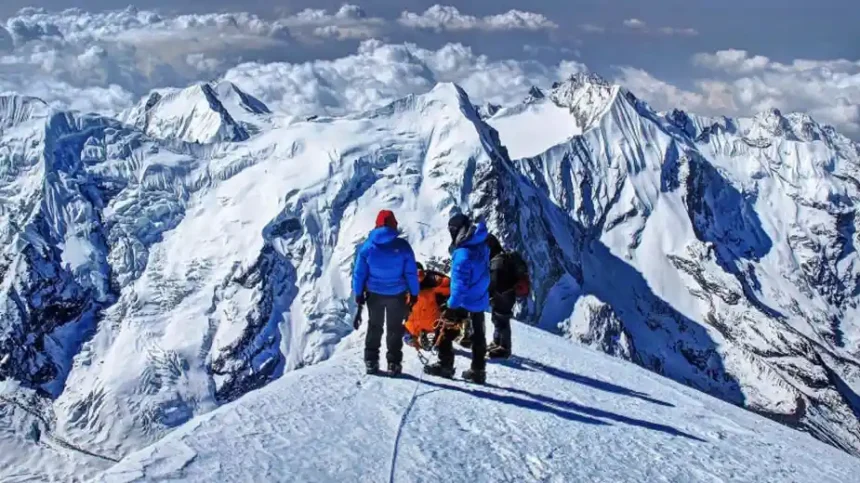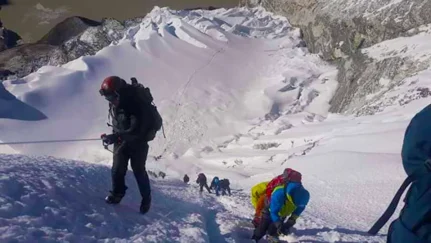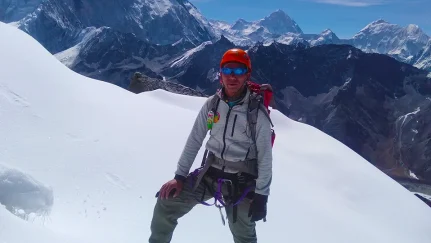How It Feels to Sleep at 5,100m – Life at Island Peak Base Camp
Sleeping at Island Peak Base Camp is a very special experience. You are high up in the Himalayas, far away from cities, cars, and noise. At night, it is very quiet, and the stars shine brightly above you. But because you are sleeping at the island peak base camp altitude of 5,100 meters, it can also feel a little strange for your body.
The first thing you will feel is the cold. Even if the sun is strong during the day, once it goes down, the temperature drops fast. The wind also makes it feel colder. You need a good sleeping bag that is made for cold places. Most people use a four-season sleeping bag and also wear thermal clothes at night. A warm hat and thick socks also help a lot.
The island peak base camp height is high enough that the air has much less oxygen than at sea level. This means it is harder to breathe, especially when you lie down to sleep. You may feel like you are breathing faster than normal. Some people wake up in the night just to catch their breath. This is normal at this island peak base camp elevation, and your body needs time to adjust.
Your sleep might feel different, too. It may be lighter or broken. You might wake up a few times during the night. This happens because your body is working hard to get used to the thin air. That is why it is very important to rest more and not push yourself too hard while staying at Base Camp Island Peak.
Even though it is cold and breathing is hard, many people find sleeping at Island Peak bc a beautiful experience. The sounds of wind and nature, the view of the stars, and the feeling of being close to the summit make it special. People often say it is one of the most peaceful nights of their trekking journey.
During the island peak climb, your guide will tell you how to stay warm and sleep better. Drinking warm water, avoiding alcohol, and eating a good dinner can help. You should also keep a water bottle inside your sleeping bag so it doesn’t freeze.
The next stop after Island Peak base camp is usually Island Peak high camp, which is even higher. The island peak high camp altitude is about 5,600 meters, so sleeping there is even tougher. Many people feel very tired and cold there, and sleep is even lighter. But with good gear, a strong mindset, and rest at Island Peak bc, your body will be more ready.
In short, sleeping at Island Peak base camp is cold, quiet, and a little tough, but it’s also peaceful and full of mountain magic. You learn to listen to your body, take care of yourself, and enjoy the high Himalayan world. Being at Island Peak base camp is not just about sleep. It’s about feeling part of something bigger.
What You’ll Eat and Drink at Island Peak Base Camp
When you reach Island Peak Base Camp, you are already at a very high place—about 5,100 meters above sea level. The island peak base camp altitude is not easy for the body. That’s why eating and drinking properly is very important. It helps you stay strong, warm, and ready for the climb ahead.
At this height, food is simple but warm and filling. You won’t find fancy restaurants here. Meals are made by the camp’s cooking team, often in a tent kitchen. One common meal is dal bhat, a Nepali dish made of rice, lentil soup, and some vegetables. It gives you energy and is easy to digest. It is also served hot, which is helpful in cold weather.
Other popular foods at Island Peak bc include noodles, soups, fried rice, pasta, and boiled potatoes. These are high in carbohydrates, which your body needs more of at the Island Peak base camp height. Sometimes you may also get eggs or a simple bread called chapati. The food is not fancy, but it is warm and helps keep you full and warm.
Drinks are just as important. You must drink a lot of water at Base Camp Island Peak. At this island peak base camp elevation, your body loses water faster than normal. The air is dry, and your breathing becomes quicker. That’s why staying hydrated is one of the most important things you can do.
You can drink boiled water, which is safe, or bring water purification tablets. Warm drinks are often given at camp. These can include black tea, lemon tea, ginger tea, or hot chocolate. Soups are also good because they help you stay hydrated while providing some nutrients. Avoid alcohol and too much caffeine, as they can make altitude sickness worse.
During your Island Peak base camp climb, eating and drinking well become part of your daily routine. Your guide and cook will remind you to eat enough, even if you are not very hungry. Sometimes, at high altitude, people lose their appetite. But eating even small amounts often helps you feel better.
If you have any food allergies or are a vegetarian, it is a good idea to tell your trekking company in advance. They can prepare meals that match your needs.
As you get ready to climb higher to Island Peak high camp, eating and drinking become even more important. The island peak high camp altitude is about 5,600 meters, and your body will need more energy. The food at high camp is often even simpler—maybe some soup, porridge, or noodles. But what matters most is that it’s warm and gives you energy.
To sum up, food at Island Peak Base Camp is basic but filling. Hot meals and warm drinks help you feel better and stay strong. Eating well and staying hydrated at Island Peak Base Camp is one of the best ways to stay healthy at this high altitude. Whether you are resting at Island Peak bc or moving to Island Peak High Camp, your meals help fuel your adventure.
Getting Ready for the Summit Push from Island Peak Base Camp
The evening before the summit climb at Island Peak Base Camp feels very different. You can sense the excitement and nervous energy in the air. Everyone knows that the real challenge is about to begin. The island peak base camp altitude is already high at around 5,100 meters, and the next step is even higher and tougher.
Most climbers rest early after dinner. The meal is usually light but warm—like soup, noodles, or rice. After that, people check their gear one last time. Climbing boots, harness, crampons, helmet, headlamp, and warm layers all need to be ready. Since the climb usually starts before midnight, everything must be packed and placed properly the night before. At this island peak base camp height, thinking ahead is very important.
Your guide or team leader will often hold a short meeting. They go over the plan, check the weather, and explain the safety rules. Oxygen levels are low at Island Peak base camp elevation, so even simple tasks like packing your bag can feel harder. People are told to drink water, stay calm, and try to rest.
The tents at base camp Island Peak, are quiet by 7 or 8 pm. Most climbers try to sleep, even if only for a few hours. Some may feel nervous and can’t sleep well, while others try deep breathing to relax. The cold is strong, and the wind can blow hard, but you stay warm inside your sleeping bag, waiting for your guide to wake you.
At around 11 pm or midnight, the wake-up call comes. It’s time to start your journey to the summit. People put on their gear slowly, step by step. At Island Peak bc, the dark night feels calm but also full of energy. Everyone moves carefully, headlamps lighting the path ahead.
The route goes first to Island Peak High Camp, which is at about 5,600 meters. The island peak high camp altitude is even harder for breathing. Climbers do not stay long here, just rest a little, eat something, and continue climbing. It is important not to stop for too long in the cold.
The summit push is the most demanding part of the Island Peak base camp trek. But preparing well at Island Peak bc helps a lot. Guides double-check harnesses, ropes, and boots. Everyone is reminded to move slowly and follow instructions. There is no need to rush, as safety is the most important thing.
By sunrise, most climbers are near the final ridge, and the dream of standing on Island Peak becomes closer. But it all begins with a calm and careful night at Island Peak Base Camp. That is where you take your last deep breath before the real climb begins.
Whether it’s your first summit or not, the moment of getting ready at Island Peak Base Camp will stay in your memory forever. It’s when your training, courage, and teamwork come together in the quiet of the mountains.
Conclusion
Staying at Island Peak Base Camp is a big part of your journey to the summit. At 5,100 meters, the island peak base camp altitude is high enough that your body starts to feel real changes. Breathing becomes harder, the nights are colder, and even sleeping feels different. But it’s also a beautiful and peaceful place where you connect with the mountains more deeply.
Whether you’re eating a warm bowl of soup, trying to stay warm in your sleeping bag, or preparing your gear for the final climb, every moment at Island Peak bc feels special. The meals are simple but comforting. Drinking water and staying hydrated are just as important as wearing the right jacket. The body needs extra care at this island peak base camp elevation, and even little things like warm tea or layered clothes can make a big difference.
The most exciting time is the night before the summit push. People feel both nervous and excited. Gear checks, weather talks, and team plans help everyone feel ready. You know the next day is going to be tough, but you’ve made it this far, and that means a lot. From base camp island peak, you head toward island peak high camp, gaining more height and facing colder winds at the island peak high camp altitude.
This part of the island peak base camp climb teaches patience, strength, and teamwork. You learn how to listen to your body and how to move slowly but surely. The island peak base camp height may challenge you, but it also helps prepare you for the final push.
In the end, Island Peak Base Camp is not just a stop—it’s where dreams start to feel real, and where you gather the courage to climb higher.














